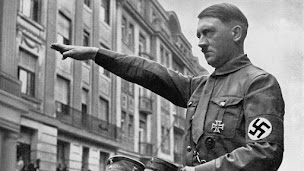NAZI GERMANY AND THE UNKNOWNS OF ADOLF HITLER
Adolf Hitler was born on April 30, 1889, in the town of Braunau Am Inn in Upper Austria, where the population was predominantly German, as the son of Alois Hitler, a customs official. Contrary to popular belief, he does not have Jewish ancestry. His name in old German means 'noble wolf' (Adolf= Adel + Wolf). Among his relatives, he was nicknamed 'Adi,' but after 1920, Hitler adopted the nickname 'Wolf.' Hitler enjoyed reading the books of Karl May during his high school days. He constantly clashed with his father, who wanted him to become a civil servant, as he aspired to become an artist. However, he could not fulfill this dream. He lost his father to a lung hemorrhage at the age of 13. After squandering the large inheritance left by his father and becoming impoverished, Hitler began staying in homeless shelters in Vienna. Subsequently, in May 1913, he moved to the city of Munich in Germany and enrolled in the German army a year later. Hitler was partially blinded in a mustard gas attack near the city of Ypres in Belgium during World War I, which deeply affected him.
In 1920, the party adopted the name National Socialist German Workers' Party (NSDAP), and Hitler ascended to the party's leadership in 1921. He then bestowed upon himself the title of 'Führer.' Adolf Hitler was a national socialist (far-right), authoritarian, anti-Marxist, anti-democratic, and a pan-German nationalist. In this direction, he wrote the book 'Mein Kampf'. He held extreme racist and anti-Semitic views, advocating for the superiority of the Aryan race. Consequently, he adopted an aggressive stance in politics.
Alongside Adolf Hitler, other prominent figures of the Nazi regime included Joseph Goebbels and Heinrich Himmler.
Hitler's Nazi regime, which was also far-right and racist, aligned with his views. The Nazis radically changed Germany's policies, not only enacting anti-Jewish laws but also implementing a racist agenda in education and even banning homosexuality. They established a totalitarian structure to control all aspects of the state, utilizing propaganda as a crucial tool. Following their racist policies, the Nazi regime pursued genocide against minorities, primarily Jews, by rounding them up in camps and carrying out the Holocaust. Economically, they directed all investments towards Germany's military infrastructure and armament in preparation for war.
Internally, the Nazi government subjugated the populace through propaganda, while externally, they pursued Hitler's expansionist policies. Hitler inaugurated the Berlin Olympics in 1936, which Nazi Germany utilized for propaganda purposes. The 1936 Olympics, hosted by Germany for both the summer and winter events, aimed to mask the growing militarism against Jews and Roma, presenting an image of a strong and united Germany. Germany's policy of invasion towards neighboring countries led to the outbreak of World War II (September 1, 1939, Nazi Germany's invasion of Poland), fundamentally altering regional and global balances. Adolf Hitler signed a secret authorization document in January 1940, sanctioning the systematic killing of mentally or physically disabled individuals residing in health institutions in Germany or German-controlled territories, under the "euthanasia" program. This remains the only documented instance of Hitler authorizing a systematic mass killing program. The Nazi regime's crimes against humanity, such as the Holocaust (formally initiated in 1941), garnered significant international attention, shaping the post-World War II international landscape. Ultimately, Hitler's ideology and policies not only changed the balance of power in Germany but also globally.
As the defeat of Germany in the war became certain, Hitler, surviving an assassination attempt orchestrated by military and civilian officials in 1944, decided to commit suicide on April 30, 1945, in Berlin, along with his wife Eva Braun. They locked themselves in a room, where Eva Braun ingested a capsule containing cyanide, resulting in instant death, followed by Hitler biting into a cyanide capsule and simultaneously shooting himself in the right temple with a pistol. Following his wishes, their bodies were doused with gasoline and burned in a bomb crater in the garden of the Führerbunker. It is claimed that Hitler's motive for this act was to avoid being captured and publicly humiliated by the Soviet army. Before his suicide, Hitler reportedly told his accompanying generals, 'You must never hand over my body to the Russians; they will make a spectacle in Moscow with it.' Ultimately, Hitler's ideology and policies not only changed the balance of power in Germany but also globally.
SOURCES
https://encyclopedia.ushmm.org/content/tr/article/adolf-hitler-key-dates
https://dergipark.org.tr/tr/pub/akader/issue/40154/414654
http://ecider.cumhuriyet.edu.tr/tr/pub/issue/38391/450186
https://alternatifpolitika.com/makale/arsiv-belgelerine-gore-1933-yili-turkiye-almanya-iliskileri
https://encyclopedia.ushmm.org/content/tr/article/foundations-of-the-nazi-state
KARDELEN PAŞALI
BÖLGESEL ANALİZ TOPLULUĞU
SİYASET BİLİMİ VE ULUSLARARASI İLİŞKİLER
MUĞLA SITKI KOÇMAN ÜNİVERSİTESİ






Yorumlar
Yorum Gönder